原因状语从句表原因
- 格式:doc
- 大小:22.50 KB
- 文档页数:2
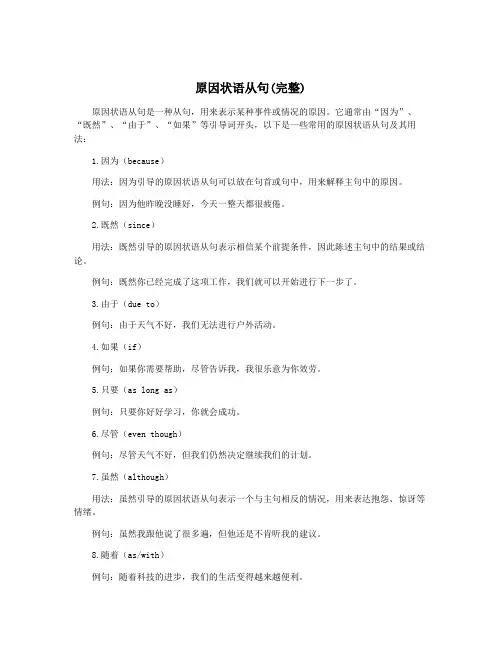
原因状语从句(完整)
原因状语从句是一种从句,用来表示某种事件或情况的原因。
它通常由“因为”、“既然”、“由于”、“如果”等引导词开头,以下是一些常用的原因状语从句及其用法:
1.因为(because)
用法:因为引导的原因状语从句可以放在句首或句中,用来解释主句中的原因。
例句:因为他昨晚没睡好,今天一整天都很疲倦。
2.既然(since)
用法:既然引导的原因状语从句表示相信某个前提条件,因此陈述主句中的结果或结论。
例句:既然你已经完成了这项工作,我们就可以开始进行下一步了。
3.由于(due to)
例句:由于天气不好,我们无法进行户外活动。
4.如果(if)
例句:如果你需要帮助,尽管告诉我,我很乐意为你效劳。
5.只要(as long as)
例句:只要你好好学习,你就会成功。
6.尽管(even though)
例句:尽管天气不好,但我们仍然决定继续我们的计划。
7.虽然(although)
用法:虽然引导的原因状语从句表示一个与主句相反的情况,用来表达抱怨、惊讶等情绪。
例句:虽然我跟他说了很多遍,但他还是不肯听我的建议。
8.随着(as/with)
例句:随着科技的进步,我们的生活变得越来越便利。
总之,原因状语从句是一种非常重要的语法结构,它可以表达出各种事件或情况的原因,让句子的意思更加清晰明了。
希望通过以上的例句和用法介绍,能够帮助大家更好地掌握原因状语从句的用法。
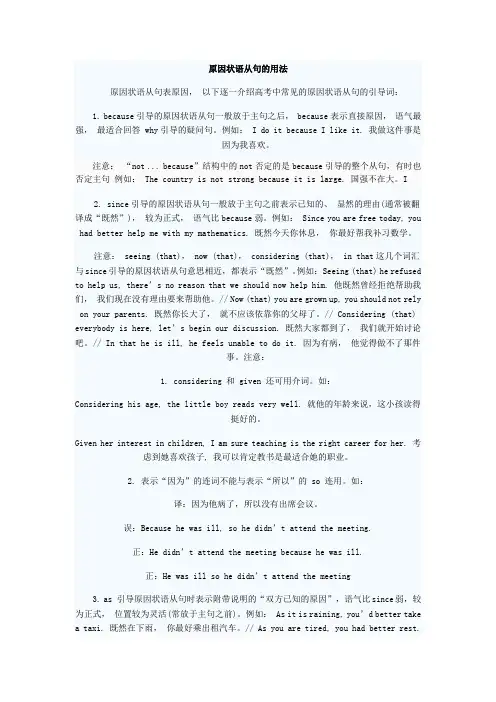
原因状语从句的用法原因状语从句表原因,以下逐一介绍高考中常见的原因状语从句的引导词:1. because引导的原因状语从句一般放于主句之后, because表示直接原因,语气最强,最适合回答 why引导的疑问句。
例如: I do it because I like it. 我做这件事是因为我喜欢。
注意:“not ... because”结构中的not否定的是because引导的整个从句,有时也否定主句例如: The country is not strong because it is large. 国强不在大。
I2. since引导的原因状语从句一般放于主句之前表示已知的、显然的理由(通常被翻译成“既然”),较为正式,语气比because弱。
例如: Since you are free today, you had better help me with my mathematics. 既然今天你休息,你最好帮我补习数学。
注意: seeing (that), now (that), considering (that), in that这几个词汇与since引导的原因状语从句意思相近,都表示“既然”。
例如: Seeing (that) he refused to help us, there’s no reason that we should now help him. 他既然曾经拒绝帮助我们,我们现在没有理由要来帮助他。
// Now (that) you are grown up, you should not rely on your parents. 既然你长大了,就不应该依靠你的父母了。
// Considering (that) everyb ody is here, let’s begin our discussion. 既然大家都到了,我们就开始讨论吧。
// In that he is ill, he feels unable to do it. 因为有病,他觉得做不了那件事。
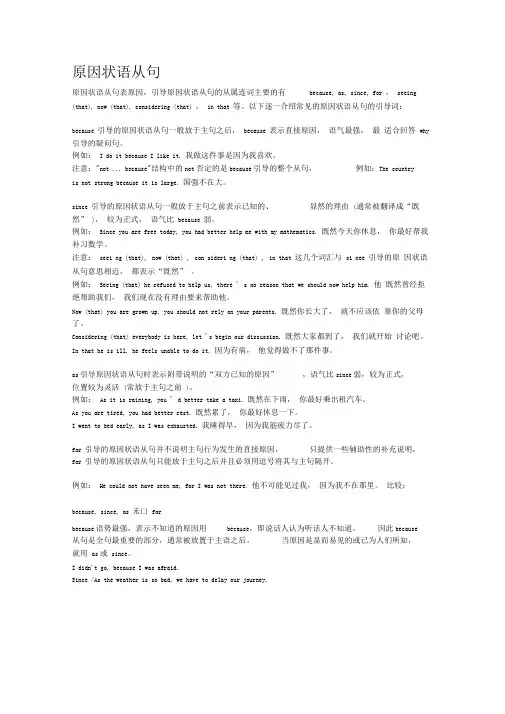
原因状语从句原因状语从句表原因,引导原因状语从句的从属连词主要的有because, as, since, for ,seeing (that), now (that), considering (that) ,in that 等。
以下逐一介绍常见的原因状语从句的引导词:because 引导的原因状语从句一般放于主句之后,because 表示直接原因,语气最强,最适合回答why 引导的疑问句。
例如:I do it because I like it. 我做这件事是因为我喜欢。
注意:"not ... because"结构中的not否定的是because引导的整个从句,例如:The countryis not strong because it is large. 国强不在大。
since 引导的原因状语从句一般放于主句之前表示已知的、显然的理由(通常被翻译成“既然” ),较为正式,语气比because 弱。
例如:Since you are free today, you had better help me with my mathematics. 既然今天你休息,你最好帮我补习数学。
注意:seei ng (that), now (that) , con sideri ng (that) , in that 这几个词汇与si nee 引导的原因状语从句意思相近,都表示“既然” 。
例如:Seeing (that) he refused to help us, there ' s no reason that we should now help him. 他既然曾经拒绝帮助我们,我们现在没有理由要来帮助他。
Now (that) you are grown up, you should not rely on your parents. 既然你长大了,就不应该依靠你的父母了。
Considering (that) everybody is here, let 's begin our discussion. 既然大家都到了,我们就开始讨论吧。

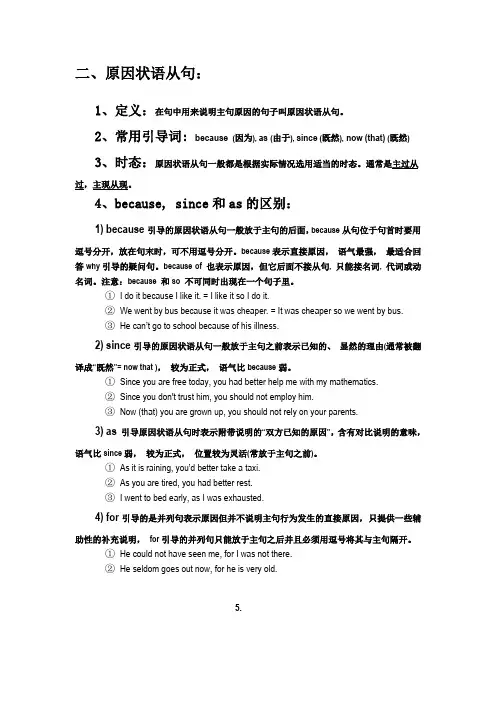
1、定义:在句中用来说明主句原因的句子叫原因状语从句。
2、常用引导词: because(因为), as (由于), since (既然), now (that) (既然)3、时态:原因状语从句一般都是根据实际情况选用适当的时态。
通常是主过从过,主现从现。
4、because, since和as的区别:1) because引导的原因状语从句一般放于主句的后面,because从句位于句首时要用逗号分开,放在句末时,可不用逗号分开。
because表示直接原因,语气最强,最适合回答why引导的疑问句。
because of 也表示原因,但它后面不接从句, 只能接名词, 代词或动名词。
注意:because 和so 不可同时出现在一个句子里。
①I do it because I like it. = I like it so I do it.②We went by bus because it was cheaper. = It was cheaper so we went by bus.③He can’t go to school because of his illness.2) since引导的原因状语从句一般放于主句之前表示已知的、显然的理由(通常被翻译成“既然”= now that ),较为正式,语气比because弱。
①Since you are free today, you had better help me with my mathematics.②Since you don't trust him, you should not employ him.③Now (that) you are grown up, you should not rely on your parents.3) as引导原因状语从句时表示附带说明的“双方已知的原因”,含有对比说明的意味,语气比since弱,较为正式,位置较为灵活(常放于主句之前)。
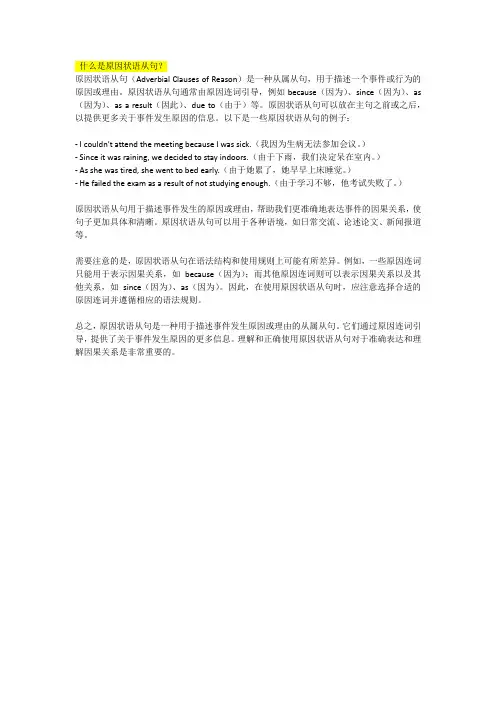
什么是原因状语从句?原因状语从句(Adverbial Clauses of Reason)是一种从属从句,用于描述一个事件或行为的原因或理由。
原因状语从句通常由原因连词引导,例如because(因为)、since(因为)、as (因为)、as a result(因此)、due to(由于)等。
原因状语从句可以放在主句之前或之后,以提供更多关于事件发生原因的信息。
以下是一些原因状语从句的例子:- I couldn't attend the meeting because I was sick.(我因为生病无法参加会议。
)- Since it was raining, we decided to stay indoors.(由于下雨,我们决定呆在室内。
)- As she was tired, she went to bed early.(由于她累了,她早早上床睡觉。
)- He failed the exam as a result of not studying enough.(由于学习不够,他考试失败了。
)原因状语从句用于描述事件发生的原因或理由,帮助我们更准确地表达事件的因果关系,使句子更加具体和清晰。
原因状语从句可以用于各种语境,如日常交流、论述论文、新闻报道等。
需要注意的是,原因状语从句在语法结构和使用规则上可能有所差异。
例如,一些原因连词只能用于表示因果关系,如because(因为);而其他原因连词则可以表示因果关系以及其他关系,如since(因为)、as(因为)。
因此,在使用原因状语从句时,应注意选择合适的原因连词并遵循相应的语法规则。
总之,原因状语从句是一种用于描述事件发生原因或理由的从属从句。
它们通过原因连词引导,提供了关于事件发生原因的更多信息。
理解和正确使用原因状语从句对于准确表达和理解因果关系是非常重要的。
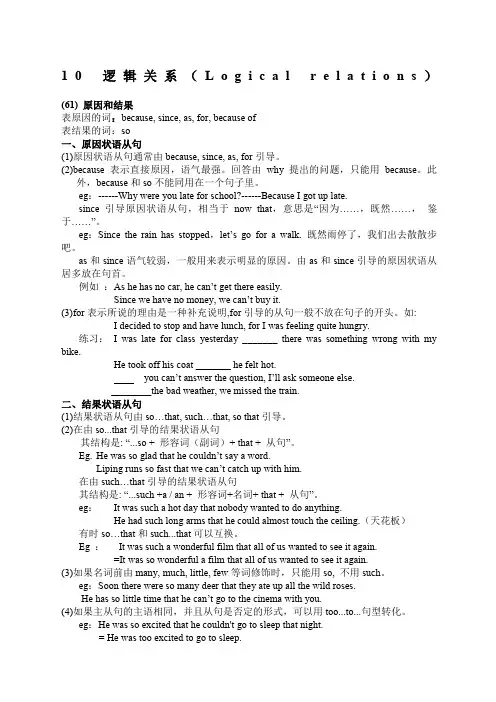
10逻辑关系(L o g i c a l r e l a t i o n s)(61) 原因和结果表原因的词:because, since, as, for, because of表结果的词:so一、原因状语从句(1)原因状语从句通常由because, since, as, for引导。
(2)because表示直接原因,语气最强。
回答由why提出的问题,只能用because。
此外,because和so不能同用在一个句子里。
eg:------Why were you late for school?------Because I got up late.since引导原因状语从句,相当于now that,意思是“因为……,既然……,鉴于……”。
eg:Since the rain has stopped,let’s go for a walk. 既然雨停了,我们出去散散步吧。
as和since语气较弱,一般用来表示明显的原因。
由as和since引导的原因状语从居多放在句首。
例如:As he has no car, he can’t get there easily.Sin ce we have no money, we can’t buy it.(3)for表示所说的理由是一种补充说明,for引导的从句一般不放在句子的开头。
如:I decided to stop and have lunch, for I was feeling quite hungry.练习:I was late for class yesterday _______ there was something wrong with my bike.He took off his coat _______ he felt hot.you can’t answer the question, I’ll ask someone else.________the bad weather, we missed the train.二、结果状语从句(1)结果状语从句由so…that, such…that, so that引导。
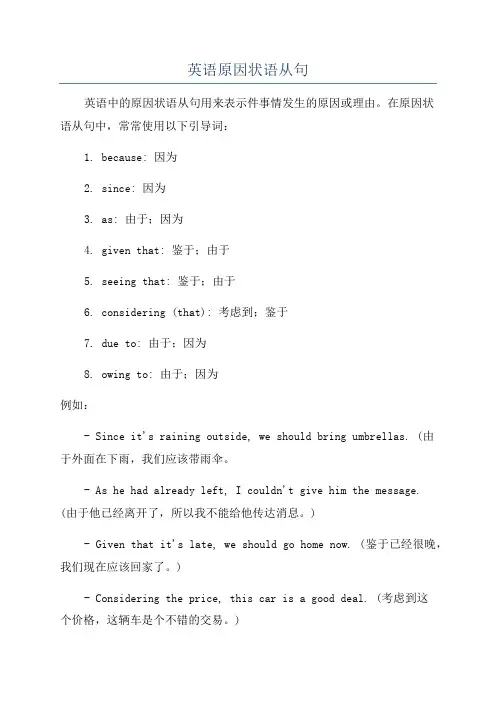
英语原因状语从句
英语中的原因状语从句用来表示件事情发生的原因或理由。
在原因状
语从句中,常常使用以下引导词:
1. because: 因为
2. since: 因为
3. as: 由于;因为
4. given that: 鉴于;由于
5. seeing that: 鉴于;由于
6. considering (that): 考虑到;鉴于
7. due to: 由于;因为
8. owing to: 由于;因为
例如:
- Since it's raining outside, we should bring umbrellas. (由
于外面在下雨,我们应该带雨伞。
- As he had already left, I couldn't give him the message. (由于他已经离开了,所以我不能给他传达消息。
)
- Given that it's late, we should go home now. (鉴于已经很晚,我们现在应该回家了。
)
- Considering the price, this car is a good deal. (考虑到这
个价格,这辆车是个不错的交易。
)
- Due to bad weather, the flight was cancelled. (由于恶劣的
天气,航班被取消了。
)
- Owing to his hard work, he was promoted. (由于他的努力工作,他得到了晋升。
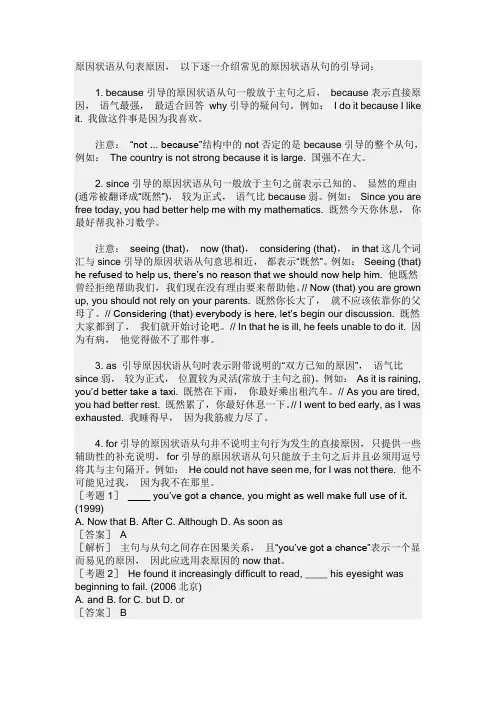
原因状语从句表原因,以下逐一介绍常见的原因状语从句的引导词:1. because引导的原因状语从句一般放于主句之后,because表示直接原因,语气最强,最适合回答why引导的疑问句。
例如:I do it because I like it. 我做这件事是因为我喜欢。
注意:“not ... because”结构中的not否定的是because引导的整个从句,例如:The country is not strong because it is large. 国强不在大。
2. since引导的原因状语从句一般放于主句之前表示已知的、显然的理由(通常被翻译成“既然”),较为正式,语气比because弱。
例如:Since you are free today, you had better help me with my mathematics. 既然今天你休息,你最好帮我补习数学。
注意:seeing (that),now (that),considering (that),in that这几个词汇与since引导的原因状语从句意思相近,都表示“既然”。
例如:Seeing (that) he refused to help us, there’s no reason that we should now help him. 他既然曾经拒绝帮助我们,我们现在没有理由要来帮助他。
// Now (that) you are grown up, you should not rely on your parents. 既然你长大了,就不应该依靠你的父母了。
// Considering (that) everybody is here, let’s b egin our discussion. 既然大家都到了,我们就开始讨论吧。
// In that he is ill, he feels unable to do it. 因为有病,他觉得做不了那件事。
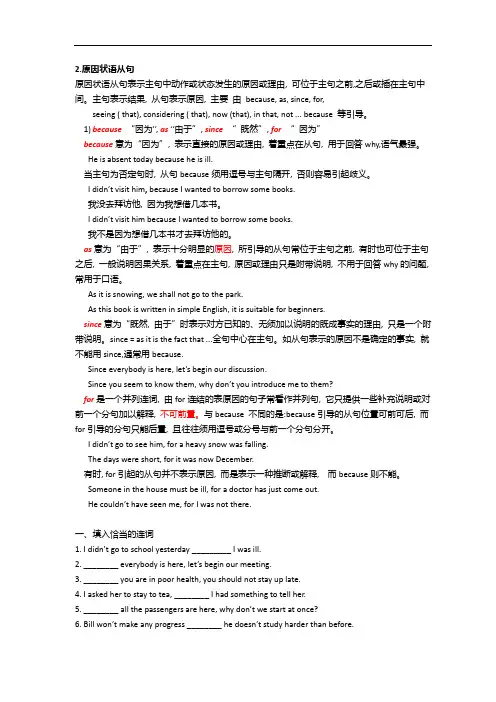
2.原因状语从句原因状语从句表示主句中动作或状态发生的原因或理由, 可位于主句之前,之后或插在主句中间。
主句表示结果, 从句表示原因, 主要由because, as, since, for,seeing ( that), considering ( that), now (that), in that, not ... because 等引导。
1) because“因为’’, as‘‘由于”, since “既然”, for“因为”because意为“因为”, 表示直接的原因或理由, 着重点在从句, 用于回答why,语气最强。
He is absent today because he is ill.当主句为否定句时, 从句because须用逗号与主句隔开, 否则容易引起歧义。
I didn’t visit him, because I wanted to borrow some books.我没去拜访他, 因为我想借几本书。
I didn’t visit him because I wanted to borrow some books.我不是因为想借几本书才去拜访他的。
as意为“由于”, 表示十分明显的原因, 所引导的从句常位于主句之前, 有时也可位于主句之后, 一般说明因果关系, 着重点在主句, 原因或理由只是附带说明, 不用于回答why的问题, 常用于口语。
As it is snowing, we shall not go to the park.As this book is written in simple English, it is suitable for beginners.since意为“既然, 由于”时表示对方已知的、无须加以说明的既成事实的理由, 只是一个附带说明。
since = as it is the fact that ...全句中心在主句。
如从句表示的原因不是确定的事实, 就不能用since,通常用because.Since everybody is here, let’s begin our discussion.Since you seem to know them, why don’t you introduce me to them?for是一个并列连词, 由for连结的表原因的句子常看作并列句, 它只提供一些补充说明或对前一个分句加以解释, 不可前置。
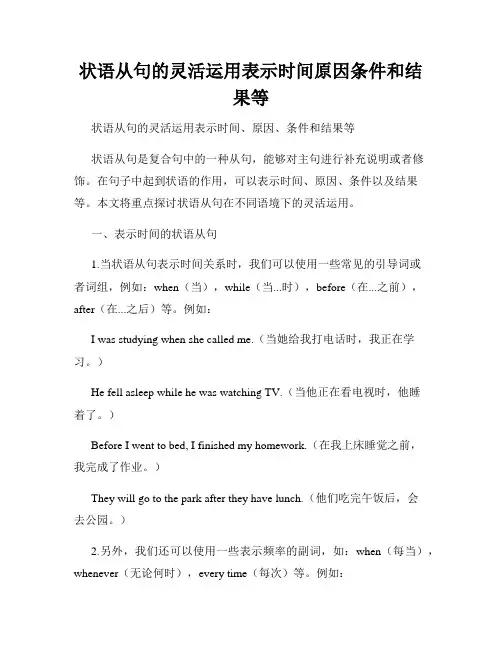
状语从句的灵活运用表示时间原因条件和结果等状语从句的灵活运用表示时间、原因、条件和结果等状语从句是复合句中的一种从句,能够对主句进行补充说明或者修饰。
在句子中起到状语的作用,可以表示时间、原因、条件以及结果等。
本文将重点探讨状语从句在不同语境下的灵活运用。
一、表示时间的状语从句1.当状语从句表示时间关系时,我们可以使用一些常见的引导词或者词组,例如:when(当),while(当...时),before(在...之前),after(在...之后)等。
例如:I was studying when she called me.(当她给我打电话时,我正在学习。
)He fell asleep while he was watching TV.(当他正在看电视时,他睡着了。
)Before I went to bed, I finished my homework.(在我上床睡觉之前,我完成了作业。
)They will go to the park after they have lunch.(他们吃完午饭后,会去公园。
)2.另外,我们还可以使用一些表示频率的副词,如:when(每当),whenever(无论何时),every time(每次)等。
例如:When it rains, I like to stay at home.(每当下雨时,我喜欢待在家里。
)Whenever I see him, he is always smiling.(无论何时我见到他,他总是笑着。
)Every time I visit my grandparents, they cook my favorite dishes.(每次我去看望我的外祖父母,他们都会做我最喜欢的菜。
)二、表示原因的状语从句1.在表示原因的状语从句中,我们常常使用引导词because(因为),since(因为),as(由于)等。
例如:I couldn't go to the party because I had to work overtime.(因为我得加班,所以无法参加聚会。
状语从句中原因和结果的表达方式状语从句是复合句的一种,常用于修饰主句的动词或整个句子的意义。
在状语从句中,原因和结果是两个常见的表达方式。
本文将探讨状语从句中原因和结果的表达方式,以加深对中文语法的理解和应用。
1. 原因表达方式在状语从句中表达原因的方式多种多样。
以下是一些常用的方式:1.1 由于/因为/由于...所以“由于”和“因为”都可以用于引导原因状语从句,表示原因和结果之间的因果关系。
“由于...所以”则更明确地表达了原因和结果之间的关联。
例如:他没睡好,因此他今天状态不佳。
由于下雨,所以我们取消了户外活动。
1.2 既然/既是...就“既然”和“既是...就”引导的状语从句常用于表达某种条件下的必然结果。
例如:既然你已经知道答案,那就请向大家解释一下。
既是老板亲自道歉,就说明他认识到了问题的严重性。
1.3 如果/假如/要是...的话“如果/假如/要是...的话”引导的状语从句表示假设条件和可能会发生的结果。
例如:如果你明天有空,我们可以一起去看电影。
要是你觉得累了,就休息一会儿吧。
1.4 以便/为了“以便”和“为了”引导的是目的状语从句,“为了”更强调结果,而“以便”更强调出发点。
例如:为了保证顺利参赛,他每天都坚持训练。
我们要提前备课,以便课堂上可以更好地引导学生。
2. 结果表达方式在状语从句中表达结果的方式也多种多样。
以下是一些常用的方式:2.1 所以/因此/因此...所有“所以”和“因此”常用于引导结果状语从句,表示因果关系。
“因此...所以”则更明确地表达了结果是因为原因的。
例如:他用功复习,所以考试取得了好成绩。
他昨晚没睡好,因此今天状态不佳。
2.2 这样/这么...以至于/结果“这样/这么”通常修饰程度词或带有程度词功能的副词,表示结果的强调。
例如:他学习这么努力,结果考了第一名。
他说了小道消息,结果闹得满城风雨。
2.3 如此...以至于“如此...以至于”表示因为某种程度或方式达到了一种结果。
原因状语从句与目的状语从句的区别与用法详解状语从句是复合句的一个重要组成部分,它能够对主句的动作或状态进行补充说明,使得整个句子更加丰富和准确。
在状语从句中,原因状语从句和目的状语从句是两种常见的类型。
本文将详细介绍原因状语从句与目的状语从句的区别以及它们的具体用法。
一、原因状语从句的特点和用法原因状语从句表示主句的动作或状态发生的原因,它通常由关联词“因为”、“由于”、“既然”、“只要”、“只有”等引导,从句中的谓语动词常用表示原因的连词“所以”、“因此”、“由此”、“因而”等来表示结果。
以下是一些常见的原因状语从句的例子:1. 由于下雨,他没有来参加聚会。
2. 因为他高烧不退,所以他无法上学。
3. 只要你努力学习,你就能取得好成绩。
4. 既然你已经决定了,我们就支持你。
从以上例子可以看出,原因状语从句可以对主句动作的原因进行进一步解释,使得句意更加明确。
二、目的状语从句的特点和用法目的状语从句表示主句的动作或状态发生的目的或目标,它通常由关联词“为了”、“以便”、“以免”、“为此”等引导,从句中的谓语动词常用表示目的的连词“以便”、“以免”、“为了”、“所以”等来表示结果。
以下是一些常见的目的状语从句的例子:1. 为了保护环境,我们应该少开车。
2. 我要努力学习,以便考上理想的大学。
3. 他换工作是为了能够更好地发展自己的事业。
4. 为了不迟到,他每天都早早地起床。
从以上例子可以看出,目的状语从句可以对主句动作的目的或目标进行进一步解释,使得句意更加明确。
三、原因状语从句与目的状语从句的区别尽管原因状语从句和目的状语从句都是状语从句的一种,但它们在用法上有一些区别。
1. 语义区别:原因状语从句主要表示主句动作的原因,目的状语从句主要表示主句动作的目的或目标。
2. 关联词区别:原因状语从句常用的关联词有“因为”、“由于”等,而目的状语从句常用的关联词有“为了”、“以便”等。
3. 结果表示:原因状语从句中,谓语动词常用表示结果的连词是“所以”、“因此”等;而目的状语从句中,谓语动词常用表示结果的连词是“以便”、“以免”等。
英语原因状语从句
英语中的原因状语从句用来表达一个事件、行为或情况的原因。
以下是一些常用的原因状语从句的引导词和用法:
1. because:表示直接原因,连接主句和从句。
- I stayed home because I was feeling sick.
2. since:表示原因或理由,常用于口语中,连接主句和从句。
- Since it's raining, we should stay inside.
3. as:表示原因或理由,连接主句和从句。
- I couldn't study as I had to work late.
4. since:表示原因或理由,连接主句和从句。
- She couldn't attend the meeting since she was out of town.
5. due to:表示原因或由于,连接主句和从句。
- The flight was canceled due to bad weather.
6. owing to:表示原因或由于,连接主句和从句。
- Owing to the heavy traffic, I arrived late for the meeting.
7. on account of:表示原因或因为,连接主句和从句。
- We couldn't go on the trip on account of the bad weather.
需要注意的是,在原因状语从句中,主句和从句的主语一般应该保持一致,或根据具体语境做出相应的修饰。
原因状语从句引导词
句子的种类 1.原因状语从句
它可以表示原因或条件,引导的从句中一般使用because、as、since、if、so that 等连接词。
1、你应该多读书,因为我们在一个竞争激烈的社会里生活。
2、我准备参加职业资格证书考试,因为这样可以提高个人知识能力,使自己更容易在职场脱颖而出。
3、虽然事情很紧张,但我们还是要保持乐观的态度,因为只有乐观的人才能获得成功。
4、面对生活中变化的挑战,我们都应该拿出勇气来挑战,因为那样可以赢得成功的收获。
5、他咬牙决定要去学习一门新的外语,因为他知道这是他发展事业的必备条件。
6、尽管面临着许多困难,但她努力工作,因为只有不放弃才能获得成功。
7、明白自己做什么对自己有好处,因为只有正确的行动才能走向成功。
8、每个人都应该反思自己的行为,因为只有明白自己行为的后果,才能做出正确的决定。
9、你应该多花一点时间了解世界,因为它可以给你更多的视野,帮助你发展出不一样的思考能力。
10、家庭教育应该健全,因为它是教育一个人健康成长的基石,也是引导一个人未来发展的根基。
原因状语从句
引导原因状语从句的连词有:because、since、as、now that、seeing that、considering that、given that等。
1、because用来回答why的提问,表示的原因预期最强,一般用在主句后面。
因为他有病,才不能和我们一起去。
因为他太粗心,所以失败了。
昨足球赛被推迟了是因为下雨。
2、since引导的从句语气仅次于because引导的从句,常表示稍加分析后推断出来的原因,
或指的是人们已知的事实,比as正式,一般译成“既然,鉴于”,常置于句首。
既然没有人反对,我们就实施这个计划吧。
既然他回答不了这个问题,你最好问别人吧。
3、as语气最弱,其原因只是对结果的附带说明,一般放在句首。
他对英语懂得不多,所以他经常在字典里查阅他不认识的单词。
由于他没有及时做好准备,我们没等他就走了。
由于他走得急,他把包落在家里了。
原因状语从句表原因,以下逐一介绍高考中常见的原因状语从句的引导词:
1. because引导的原因状语从句一般放于主句之后,because表示直接原因,语气最强,最适合回答why引导的疑问句。
例如:I do it because I like it. 我做这件事是因为我喜欢。
注意:“not ... because”结构中的not否定的是because引导的整个从句,例如:The country is not strong because it is large. 国强不在大。
2. since引导的原因状语从句一般放于主句之前表示已知的、显然的理由(通常被翻译成“既然”),较为正式,语气比because弱。
例如:Since you are free today, you had better help me with my mathematics. 既然今天你休息,你最好帮我补习数学。
注意:seeing (that),now (that),considering (that),in that这几个词汇与since引导的原因状语从句意思相近,都表示“既然”。
例如:Seeing (that) he refused to help us, there’s no reason that we should now help him. 他既然曾经拒绝帮助我们,我们现在没有理由要来帮助他。
// Now (that) you are grown up, you should not rely on your parents. 既然你长大了,就不应该依靠你的父母了。
// Considering (that) everybody is here, let’s beg in our discussion. 既然大家都到了,我们就开始讨论吧。
// In that he is ill, he feels unable to do it. 因为有病,他觉得做不了那件事。
3. as 引导原因状语从句时表示附带说明的“双方已知的原因”,语气比since弱,较为正式,位置较为灵活(常放于主句之前)。
例如:As it is raining, you’d better take a taxi. 既然在下雨,你最好乘出租汽车。
// As you are tired, you had better rest. 既然累了,你最好休息一下。
// I went to bed early, as I was exhausted. 我睡得早,因为我筋疲力尽了。
4. for引导的原因状语从句并不说明主句行为发生的直接原因,只提供一些辅助性的补充说明,for引导的原因状语从句只能放于主句之后并且必须用逗号将其与主句隔开。
例如:He could not have seen me, for I was not there. 他不可能见过我,因为我不在那里。
[考题1]____ you’ve got a chance, you might as well make full use of it. (1999)
A. Now that
B. After
C. Although
D. As soon as
[答案]A
[解析]主句与从句之间存在因果关系,且“you’ve got a chance”表示一个显而易见的原因,因此应选用表原因的now that。
[考题2]He found it increasingly difficult to read, ____ his eyesight was beginning to fail. (2006北京)
A. and
B. for
C. but
D. or
[答案]B
[解析]“his eyesight was beginning to fail”是“he found it increasingly difficult to read”的原因,因此本题应选用可以表示原因的连词for引导原因状语从句。
[考题3]A man cannot smile like a child, ____ a child smiles with his eyes, while a man smiles with his lips alone. (2006湖南)
A. so
B. but
C. and
D. for
[答案]D
[解析]下划线处之后的句子补充说明“a man cannot smile like a child”的原因,应选用for表原因。
[上一页][1][2][3][4][5][6][7][8][9][10]
[下一。